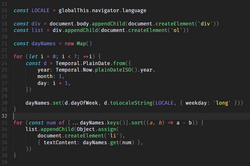object-oriented programming, a class defines the shared aspects of objects created from the class. The capabilities of a class differ between programming languages...
46 KB (4,290 words) - 01:36, 3 June 2025
object-oriented programming, inheritance is the mechanism of basing an object or class upon another object (prototype-based inheritance) or class (class-based inheritance)...
32 KB (3,814 words) - 09:34, 16 May 2025
In class-based object-oriented programming languages, a leaf class is a class that should not be subclassed. This can be enforced either by convention...
1 KB (126 words) - 15:30, 5 January 2024
In computer programming, a trait is a language concept that represents a set of methods that can be used to extend the functionality of a class. In object-oriented...
22 KB (2,055 words) - 13:52, 28 January 2025
Skeleton programming is a style of computer programming based on simple high-level program structures and so called dummy code. Program skeletons resemble...
19 KB (2,500 words) - 17:31, 21 May 2025
A computer program is a sequence or set of instructions in a programming language for a computer to execute. It is one component of software, which also...
124 KB (13,091 words) - 23:57, 9 June 2025
C#, and Objective-C. Prototype-based programming (contrast) Programming paradigms Class (computer programming) Kiselyov, Oleg. "Subtyping, Subclassing...
7 KB (806 words) - 22:18, 1 February 2024
Computer programming or coding is the composition of sequences of instructions, called programs, that computers can follow to perform tasks. It involves...
42 KB (4,827 words) - 07:41, 19 June 2025
is a fundamental concept in computer science and software engineering, especially within the object-oriented programming paradigm. Examples of this include:...
31 KB (3,944 words) - 09:36, 16 May 2025
this, self, and Me are keywords used in some computer programming languages to refer to the object, class, or other entity which the currently running...
24 KB (3,119 words) - 17:19, 5 September 2024
In computer science, imperative programming is a programming paradigm of software that uses statements that change a program's state. In much the same...
33 KB (3,629 words) - 12:55, 17 June 2025
computer programming: Computer programming – process that leads from an original formulation of a computing problem to executable computer programs....
15 KB (981 words) - 19:00, 2 June 2025
In computer programming, specifically object-oriented programming, a class invariant (or type invariant) is an invariant used for constraining objects...
13 KB (1,614 words) - 09:33, 5 June 2025
In computer programming, a callback is a function that is stored as data (a reference) and designed to be called by another function – often back to the...
17 KB (1,821 words) - 03:09, 6 June 2025
History of Functional Programming Languages" (PDF). International Symposium on Trends in Functional Programming. Lecture Notes in Computer Science. Vol. 7829...
50 KB (6,372 words) - 03:37, 1 March 2025
similarity has been explained by programming language theorists in terms of existential types. In object-oriented programming languages, and other related...
16 KB (1,425 words) - 01:02, 16 June 2025
teaches fundamental principles of computer programming, including recursion, abstraction, modularity, and programming language design and implementation...
9 KB (799 words) - 21:16, 10 March 2025
Object-oriented programming (OOP) is a programming paradigm based on the concept of objects. Objects can contain data (called fields, attributes or properties)...
67 KB (7,159 words) - 22:41, 26 May 2025
In computer programming, a parameter, a.k.a. formal argument, is a variable that represents an argument, a.k.a. actual argument, a.k.a. actual parameter...
28 KB (3,596 words) - 11:57, 9 May 2025
Art of Computer Programming (TAOCP) is a comprehensive multi-volume monograph written by the computer scientist Donald Knuth presenting programming algorithms...
38 KB (4,144 words) - 15:48, 18 June 2025
In computer science, a literal is a textual representation (notation) of a value as it is written in source code. Almost all programming languages have...
4 KB (388 words) - 02:58, 24 July 2024
(computer science) Coupling (physics) Dead code elimination Dependency hell Efferent coupling Inversion of control List of object-oriented programming...
20 KB (2,453 words) - 05:37, 20 April 2025
"Hello, World!" program in a given programming language. This is one measure of a programming language's ease of use. Since the program is meant as an...
27 KB (1,940 words) - 21:50, 4 June 2025
would be a property. In class-based programming, methods are defined within a class, and objects are instances of a given class. One of the most important...
15 KB (1,837 words) - 09:33, 29 December 2024
In computer programming, a function (also procedure, method, subroutine, routine, or subprogram) is a callable unit of software logic that has a well-defined...
54 KB (6,531 words) - 04:31, 31 May 2025
minis) are a class of multi-user computers that lie in the middle range of the computing spectrum, in between the smallest mainframe computers and the largest...
18 KB (2,115 words) - 11:31, 9 March 2025
Library (computing) (redirect from Programming library)
development to implement a computer program. Commonly, a library consists of executable code such as compiled functions and classes, or a library can be a...
23 KB (2,543 words) - 08:51, 19 June 2025
In computer science, conditionals (that is, conditional statements, conditional expressions and conditional constructs) are programming language constructs...
38 KB (4,024 words) - 14:07, 24 May 2025
In computer programming, a declaration is a language construct specifying identifier properties: it declares a word's (identifier's) meaning. Declarations...
8 KB (997 words) - 05:00, 27 August 2024
object-oriented programming, a class implementation file is often used to contain the implementation code for the method(s) of a class. Programming languages...
9 KB (824 words) - 21:38, 30 December 2023








